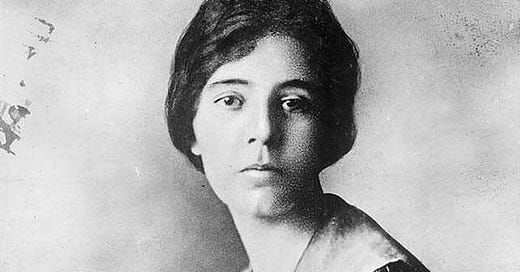I Read the GOP Platform So You Don't Have To
But first, a reminiscence about my debut in The New Republic 44 years ago.
The “hysterical feminist” Alice Paul, courtesy of the Library of Congress.
The topic of Republican Party platforms inspires in me a perverse feeling of nostalgia. There’s a logical explanation for this. In the summer of 1980 I published my first-ever article in The New Republic. My writer’s ID was “Timothy Noah, a TNR summer intern, recently graduated from Harvard College.” No academic honors were mentioned because I hadn’t received any. I was a mediocre student entering a occupation on which the academic world still looked somewhat askance. “Journalism can be an honorable profession,” my former English 10 professor, Warner Berthoff, had advised me, pausing for dramatic effect before continuing: “if pursued honorably.” I never heard from Berthoff again—he died only six years ago—so I don’t know whether he formulated an opinion about how I fared. Probably he forgot my name 15 minutes after this conversation. I note with interest that Harvard still offers English 10 today, although now it’s a course about literature published after 2000. In my day it focused on English literature published before—in most cases well before—1900. But I digress.
The Republican Party was preparing to nominate Ronald Reagan, an obvious crackpot, for president. As a resident of Massachusetts I had changed my party registration from Democrat to Republican to vote against Reagan in the primary, casting my vote for John Anderson, because I didn’t much care whether the Democratic nomination went to Jimmy Carter or Ted Kennedy. It worked! Anderson outpolled Reagan in the March primary, though the victor was not Anderson but George W. Bush, with 33 percent. Kennedy won the Democratic primary. Bush’s victory in Massachusetts helped persuade Reagan to put him on the ticket after he won the nomination. Kennedy’s victory in Massachusetts helped Reagan defeat Carter in November. In that sense my tactic did not work. But I digress.
My first article in The New Republic was published in the July 19 issue, which means it must have hit the newsstands almost exactly 44 years ago. It was titled “About Face,” and if you are a TNR subscriber you can read a facsimile of it here. It was about the Republican Party deciding to remove, from its platform, the Equal Rights Amendment. It’s probably news to you that the Republican Party ever included the ERA, but it did, because according to the convoluted politics of the early 20th century, the ERA was a plot to strip women of legal protections won only recently for them in the workplace. Here is my lede:
The Republican Party’s decision to remove the Equal Rights Amendment from the party platform, where the ERA has been included routinely since 1940, shows how conservative the party is becoming. There’s been nothing like the fuss in the Republican platform committee last week since 1926, when the National Women’s party (pro) and the Women’s Bureau (anti) quarreled at the Second Conference on Women in Industry in Washington. For years, the amendment wasn’t even controversial. In 1972 Ronald Reagan offered his name in support of it. Not until the mid-1970s, when state ratification efforts began to fail, did it become apparent that a large, visible opposition had emerged—presumably in response to the rise of a large, visible feminist movement.
By 1944, I went on to explain, labor protections for both men and women were sufficiently secure that the Democrats were willing to put support for the ERA in their platform, too, though only briefly; the Democrats dropped it for 20 years starting in 1952. Felix Frankfurter decried the ERA as “meaningless and mischievous.” Mary Anderson, head of the Women’s Bureau, said the notion of equal rights was indicative of the suffragist Alice Paul’s “hysterical feminism.” (Paul led the National Women’s Party.) During the same period, the Republicans dropped the ERA only twice, in 1964 and 1968, so really, the ERA remained a part of American politics almost entirely because Republicans favored it. The GOP dropped the ERA for good in 1980 because, it said, it opposed “any move that would give the Federal Government more power over families.” My piece about this is, if I do say so myself, excellent—far superior, in fact, to many other pieces that I wrote for The New Republic in subsequent years.
This is all a very slow windup to my sharing that I have returned, after 44 years, to the topic of the Republican Party platform. Earlier this week I wrote about what was getting left out. Today I write about what’s actually in the platform, and I’ll be writing a follow-up today. You can read Part One here.





Repuglican party platform is using Fetal (actualy Zygote) Personhood language to fool media and public that they are not anti-abortion and anti-contrception. Most media reports are falling for it, missing the dog whistle of the actual longuage. Here is what platform says:
"We proudly stand for families and Life. We believe that the 14th Amendment to the Constitution of the United States guarantees that no person can be denied Life or Liberty without Due Process, and that the States are, therefore, free to pass Laws protecting those Rights."
Per: https://www.lawyersgunsmoneyblog.com/2024/07/the-republicans-fetal-personhood-platform
"If you want to believe that “no person” refers to [only] the woman seeking an abortion, this is almost reasonable. That seems to be the way reporters are taking it, when they think about it at all." However. "If you believe that 'no person' refers to everything after conception, then this describes fetal personhood. Those persons may not be deprived of life or liberty, which means no abortions ever and banning most contraceptives. Note that the last sentence says “Birth Control,” not "Contraceptives." Abstinance, rhythm, withdrawal and maybe condom ok. Pill and IUD not.
The people pushing fetal personhood have used very similar language and probably provided this paragraph"
For what they really believe and mean see:
https://www.heritage.org/life/report/can-the-fourteenth-amendment-be-used-protect-human-life-birth#